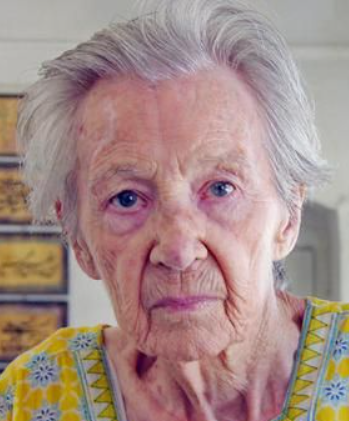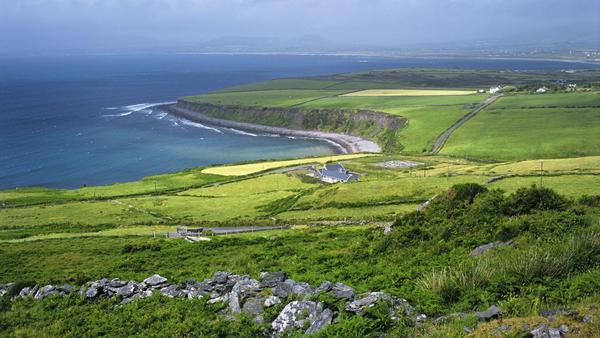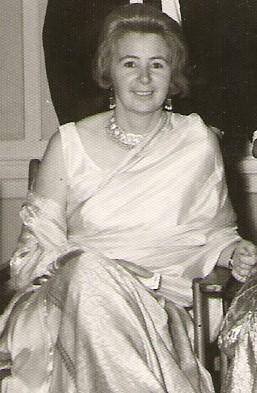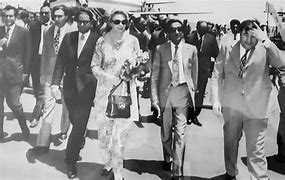March 15, 2024 Hello , Wishing you the luck of the Irish for St. Patrick's Day! Don't have a single drop of Irish blood? Go ahead and celebrate. The Irish don't seem to mind everyone horning in on their holiday. Emigrants from the old sod have carried their traditions to every continent, often leaving
a lasting imprint wherever they called home. One Irish lass, Bridget (Birdie) Jennifer Wren,l from County Kerry, spent most of her 90 years living in Balochistan Province, Pakistan. The first time she was called Queen of Balochistan, it was a mocking put-down by the Prime Minister of
Pakistan. Later, foreign journalists took up the habit, using the title in a complimentary way. But the tribespeople of Balochistan called her a name she much preferred, Mummy Jennifer.
☘️Pakistani Queen from the Emerald Isle?
How did a tough-minded Irish Catholic girl come to live most of her 90-years in the remote borderlands of Pakistan? And become the first women elected to government in a region where most girls didn't learn to read. How did she earn
the title Mummy and have the balls to try and make peace in a land fought over for generations and now a stronghold for the Taliban? When she died in 2008, thousands
of burly, turbaned, tribesmen carrying AK rifles, many of them allied with the Taliban, cheered "Mummy Jennifer" as her funeral procession moved through the city.
Birdie Jennifer Wren Musa
Birdie was born in the rolling green hills of Kerry County, Ireland, in 2017. She and her four sisters and two brothers grew up near the banks of the Shannon River, helped their parents work their small farm and went to
Catholic school.
It must have been a great adventure, when Birdie went off to England to earn a nursing degree at Exeter College at Oxford. She dropped her common Irish nickname Birdie and went by her middle name Jennifer, a tiny step away from her roots, from which
she would soon take a wild leap. At Oxford, Jennifer fell in love with a philosophy student, Qazi Mohammad Musa, the son of the chieftain of the Qalat District in Balochistan. He had grown-up under British rule near the city of Pishin on a dusty, baked plateau in what would later become Pakistan.
Located fifty miles from the Afghanistan border, Pishin is surrounded by reddish-brown mountains, "tormented by dust devils" and sees temperatures above 120 degrees Fahrenheit. With vastly different backgrounds, this young couple found something that drew them together.
"We met at his college, at a party – you know what students are like,’ she recalled later, ‘I was a Catholic, he was a Muslim. I think I became Islamic at the time. There is no difference in any of
these religions except some people believe in one god, some in another and some in lots of gods."
Birdie Jennifer Wren Musa Jennifer and Qazi married in London in 1940 and remained in England until after Pakistan gained independence in 1948, when they moved with their young son to the family bastion in Pakistan's Baluchistan Province. As family of the tribal chief, they lived in relative security within the family compound with occasional trips to Kabul, then known as the "Paris of Central Asia." In a land of camels,
the Musas owned the only car in the region. "[Their] ‘thick, mud-walled, colonial-era home... was festooned with daggers, tigers’ heads
and photographs of her extravagantly whiskered in-laws."
Initially Qazi's family had reservations about his marriage to Jennifer but came to accept her. The family were progressive Sunni Muslims and Jennifer Musa wore tribal dress but not a headscarf or burqa. Tragically, her husband died suddenly in a car accident in 1956. She thought about returning to Ireland but decided to stay and keep their 14-year-old son close to the extended family he had grown up
with.
After her husband's death, Jennifer took up her husband's leadership in tribal politics dispensing favors, settling disputes and signing chits for tribesmen who gathered at her gate. In 1970, she won a seat representing Pishin in Pakistan's first parliament in what has been called Pakistan's "first and last
free and fair elections."
Despite reservations she signed the new Pakistan Constitution in 1973, but not before insisting on greater autonomy for Balochistan. Prompting Prime Minister Zulfiqar Ali Bhutto to make his famous quip, "she just wants to be queen of Balochistan".
The blond woman with grey-blue eyes and fair skin stood her ground against her darker-haired, bearded politicians. She clashed with the new government over exploitation of her region's resources by Punjab elites and the Pakistani military and argued for better education for both men and women. At the time, Balochistan suffered the highest poverty rate
in Pakistan and the lowest literacy rate.
National Assembly Speaker Fazal Elahi Chaudary, Jennifer Musa, Akbar Khan Mohmand, Hakim Ali Zardari & Mir Ali Baksh
Talpur, Photo courtesy Vintage Pakistan.
Still, the new central rule lead to revolt and 70,000 government troops poured into the province. Jennifer tried to make peace by mediating between the insurgents and the government. Her stature allowed her to speak to the powerful, deeply conservative tribesmen: “I speak a mixture of Pashtun and Urdu, but when I get angry I go down to English and they understand me,” she told the New York Times in 1992. But the Pakistani army eventually suppressed the rebellion and the imposition of martial law ended Jennifer's seven-year term on the National Assembly. She remained the tribal head in Pishin and turned to more directly aiding "her" people. “I joined thinking I could do something for Balochistan and something for women. But you can’t liberate women until you liberate men.” She started a girl scout groups, the Pishin Women’s Association to promote female literacy and education, and the first family planning clinic in the region. In the early 1980, she established an ice factory
providing jobs locally as well as refrigeration. “I feel very much like I am at home here," she said in an interview, "they have always
treated me like one of themselves. I couldn’t have gone back to Ireland. I know more about this place now than I do about my home.”
She was, however, disillusioned with the politics, seeing the rise of hardline Sunni Islam reversing gains in women’s rights and education, stating her fears in a 2001
interview:
“Pakistan created this situation by supporting the Taliban. Now it’s even more intractable than the Irish situation. What can the Americans do? … Even if they destroy bin Laden and the Taliban, a new Taliban will come along.”
She raised her son to be a public servant. Ashraf Jehangir Qazi had a long career as a senior diplomat, serving as Ambassador to the United States from 2002-2004. He served in many
foreign posts prior, including a stint as Pakistan's High Commissioner to India and ambassador to Syria, East Germany, Russia, and China.
Jennifer and Qazi Musa's son Ashraf Jehangir Qazi.
Last year, 50-years after Jennifer Musa helped formulate Pakistan's first constitution and then watched her government's failure to uphold of equality and justice, her granddaughter Nilofer Afridi Qazi called for change. "...it is time, when two thirds of the country’s population were born a generation after the 1973 Constitution was formulated, to take another look at the social contract’s track record. Why is Pakistan on this perpetual cycle of self-destruction. Why are democracy and human rights not taking root? These are the questions we need to address publicly. Five decades of denial can only lead to more pain. It is
time. Let us make promises we plan on keeping. Let us revisit our social contract with clean hands." Mummy Jennifer would be proud. Jennifer's unwavering commitment to social justice, her fierce fight to protect tribal Muslim people she loved and the rights of women who'd been held down for generations has left an
indelible mark on her adopted home, Balochistan, Pakistan.
Like my article today? Please share with friends by email or social media:
Sources https://web.archive.org/web/20190807114515/https://www.telegraph.co.uk/news/obituaries/1575879/Jennifer-Musa.html
Follow me on social media
This newsletter is a reader-supported publication. To support my work, consider becoming a paid subscriber.
Read
a great book? Have a burning question? Let me know. If you know someone who might enjoy my newsletter or books, please forward this e-mail. I will never spam you or sell your email address, you can unsubscribe anytime at the link below. To find out more about my books, how I help students, teachers, librarians and writers visit my website at www.MaryCronkFarrell.com. Contact me at MaryCronkFarrell@gmail.com. Click here to subscribe to this newsletter. |
|
|








